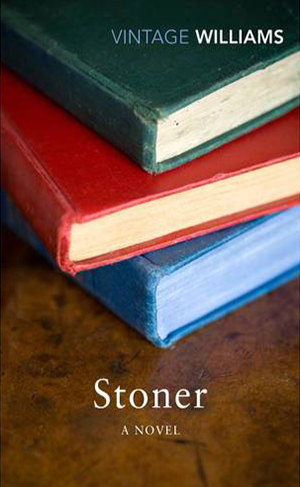Stoner has become somewhat of a publishing sensation over the past eighteen months, topping bestseller list in Holland, France, Italy, Spain, Israel and, more recently, in the UK. Written by American John Williams in 1965, Stoner barely made a mark at the time. A few favourable reviews and 2000 copies sold was all there was to it. Somehow, miraculously, nearly 50 years later, the novel has been given a second lease of life, and is now a shining example of a ‘word-of-mouth’ bestseller.
It is a curious novel to have made such a splash, with an anti-hero as protagonist and little happening, at least at the surface. It is the powerful undercurrents of emotion that make this such a special read as well as the quiet, magnificent writing.
Stoner is named after the protagonist, William Stoner, who, we learn at the outset of the novel, is an undistinguished assistant Professor of English Literature at a mediocre university in the mid-west of America. As the novel starts, Stoner has just died.
Stoner’s colleagues, who held him in no particular esteem when he was alive, speak of him rarely now; to the older ones, his name is a reminder of the end that awaits them all, and to the younger ones it is merely a sound which evokes no sense of the past and no identity with which they can associate themselves or their careers.
What is remarkable about Stoner, whose name takes on significance as you read, is how unremarkable he is. He lives a life of nothingness, in which most choices are made for him, by circumstance or other people. Stoner, a single child, grows up in poverty on a small farm in Missouri. His parents, hard working and reclusive, raise him to be the same. They are not exactly an inspiring bunch.
At thirty his father looked fifty; stooped by labor, he gazed without hope at the arid patch of land that sustained the family from one year to the next. His mother regarded her life patiently, as if it were a long moment she had to endure.
Communication between them is monosyllabic and unemotional. At times, comically so, such as when Stoner is told by his father he should to go to college.
‘County agent came by last week…Says they have a new school at the University of Columbia. They call it a College of Agriculture. Says he thinks you ought to go. It takes four years.’
He starts his studies, but, in a rare and life-changing epiphany, falls in love with literature and changes to English. It turns out to be one of the few significant decisions he makes. After finishing his degree, he joins the university as an English lecturer and stays until his death.
Stoner enters into a disastrous marriage with the cold, mentally unstable and socially superior Edith. Their only child, Grace, with whom Stoner is completely besotted, becomes the subject of a tug-of-war between the parents. Unhappy and alienated from his own family, Stoner seek solace with one of his students. Meanwhile, trouble is brewing at work, with sharp-elbowed colleagues and university politics nearly putting an end to his career.
Stoner’s friend David Masters, his complete opposite in outlook and destiny (Masters wants to see the world, joins the army and is killed in the First World War) is scathingly critical of university life, arguing that it’s position at the periphery of society, away from wars and real life, is an artificial reality.
And so providence, or society, or fate, or whatever name you want to give it, has created this hovel for us, so that we can go in out of the storm. It’s for us that the University exists, for the dispossessed of the world; not for the students, not for the selfless pursuit of knowledge, not for any reason that you hear.
Perhaps this encapsulates Stoner’s own life, a life led in a bubble, out of touch with reality, removed, for the most part, from fulfilled happiness, and to a large extent, in isolation.
Williams’ characters are brilliantly portrayed: Stoner’s salt-of-the-earth parents; Stoner himself, an honest, hardworking and kind man, passive and passionate at the same time; and the spoilt and calculating Edith.
She was educated upon the premise that she would be protected from the gross events that life might thrust in her way, and upon the premise that she had no other duty than to be a graceful and accomplished accessory to that protection, since she belonged to a social and economic class to which protection was an almost sacred obligation…
As we know from the very beginning, Stoner dies at the end of the novel. Williams’ description of his last days and eventual death, drifting in and out of consciousness, taking stock of his life during moments of clarity, only vaguely registering the presence of visitors at others, surely has got be one of the finest in the history of literature.
You will have gathered by now that Stoner is not a ‘light’ read. Rather, it is a profound, serious and rewarding novel. Although the book moves along quietly and unassumingly, the undercurrents are powerful, the anger and intensity almost excruciating at times. We have moments of intense sensuality as well as heart-breaking coldness and cruelty. It is a beautiful book about living life, the quest for fulfilment, and, above all, love.
As I mentioned in my review of Mrs Bridge by Evan S. Connell, elsewhere on this blog, there are interesting parallels between the two books. If you like Stoner, you will probably like Mrs Bridge too.
Stoner by John Williams published by Vintage Books, 278 pages.





